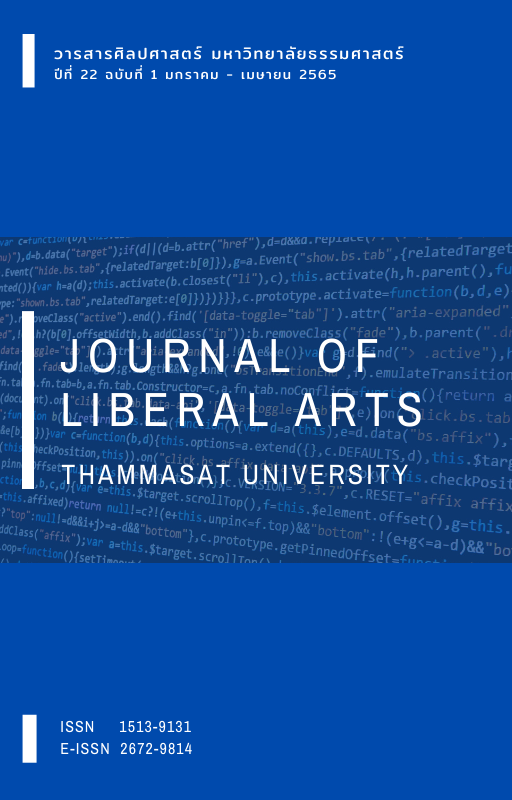Human Rights during the Pandemic—Towards an Enabling Pedagogy
Main Article Content
บทคัดย่อ
The COVID-19 pandemic that coincided with a renewed fight for racial justice in the wake of George Floyd’s death in 2020 has brought to the fore contesting debates about human rights in the USA. Such questions as who counts as “human” worthy of rights and whose freedom matters (often at the expense of whom) have been at the heart of the tumultuous events in US political and public life since the beginning of the pandemic. Set against this backdrop, this paper examines effective pedagogical practices that enable students to critically respond to these exigencies of our time. Using an intermediate literature course entitled “Memory, Human Rights and Global Anglophone Literature” I designed and taught at Elon University, North Carolina in Spring 2021, the paper outlines a few pedagogical innovations that I effectively put into practice while navigating the unique challenges posed by the pandemic. I use Joseph R. Slaughter’s articulation of “enabling fictions”—literary and legal forms that mutually inform each other to envision “free and full human personality development” of human rights—in the course design and execution. Building on Slaughter’s work, I argue that a pandemic-era classroom must integrate “enabling” activities that help students to meaningfully yoke empathy with interdisciplinary inquiry and transformative composition. An enabling classroom empowers a student coming from an entitled and insulated background to ethically imagine the pain of “the other” without reifying a hierarchical power dynamism that taints the ethos of Western human rights activism.
Downloads
Article Details

อนุญาตภายใต้เงื่อนไข Creative Commons Attribution-NonCommercial-NoDerivatives 4.0 International License.
เอกสารอ้างอิง
Agosín, M. (2015). “Foreword.” Teaching Human Rights in Literary and Cultural Studies. In A. S. Moore & E. S. Goldberg (Eds.), Modern Language Association (pp. xi-xii). n.p.
Association of American Colleges and Universities. (2021, January 7). AAC&U Statement on the Attack on the US Capitol. https://www.aacu.org/aacu-statement-attack-us-capitol
Allam, H. (2020, November 16). FBI Report: Bias-Motivated Killings at Record High Amid Nationwide Rise in Hate Crime. https://www.npr.org/2020/11/16/935439777/fbi-report-bias-motivated-killings-at-record-high-amid-nationwide-rise-in-hate-c
Baxi, U. (2008). The Teaching of Human Rights (3rd ed.). Oxford University Press.
Blake, J. (2021, May 25). There was no racial reckoning. https://www.cnn.com/2021/04/18/us/george-floyd-racial-reckoning-blake/index.html
Britannica. (2021, April 22). Humanities. https://www.britannica.com/topic/humanities
Brown, W. (2004). “The Most We Can Hope For...”: Human Rights and the Politics of Fatalism. The South Atlantic Quarterly, 103(2/3), 451-463.
Chan, S. (2005). In Defense of Asian American Studies: The Politics of Teaching and Program Building. University of Illinois Press.
Givens, T. E. (2021, April 9). Finding a Path to Bridging Racial Divides. https://www.insidehighered.com/advice/2021/04/09/importance-practicing-radical- empathy-bridge-racial-divides-opinion
Human Rights Watch. (2021, January 13). Central Asia: Pandemic Response Threatens Rights. https://www.hrw.org/news/2021/01/13/central-asia-pandemic-response-threatens-rights
Hunt, L. (2007). Inventing Human Rights: A History. W.W. Norton & Company.
Moore, A. S., & Goldberg, E. S. (2015). Introduction: Charting New Courses: Teaching Human Rights in Literary and Cultural Studies. In A. S. Moore & E. S. Goldberg (Eds.), Teaching Human Rights in Literary and Cultural Studies (pp. 1-10). The Modern Language Association of America.
Osajima, K. (1998). Critical Pedagogy in Asian American Studies: Reflections on an Experiment in Teaching. In L. R. Hirabayashi (Ed.), Teaching Asian America (pp. 59-72). Rowman & Littlefield Publishing.
Parcak, S. [@indyfromspace]. (2021, January 6). Congratulations, you just discovered “The Humanities” [Twitter]. https://twitter.com/indyfromspace/status/1347178428605325312
Rancière, J. (2004). Who is the Subject of the Rights of Man? The South Atlantic Quarterly, 103(2/3), 297-310.
Richeson, J. A. (2020). Americans Are Determined to Believe in Black Progress. https://www.theatlantic.com/magazine/archive/2020/09/the-mythology-of-racial-progress/614173/
Schlund-Vials, C. J. (2011). Re-Seeing Race in a Post-Obama Age: Asian American Studies, Comparative Ethnic Studies, and Intersectional Pedagogies. New Directions for Teaching and Learning, 2011(125), 101-109.
Slaughter, J. R. (2007). Human Rights, Inc.: The World Novel, Narrative Form, and International Law. Fordham University Press.
The Columbus Dispatch. (2021, March 15). Our view: Civics education is key to saving America from itself. https://www.dispatch.com/story/opinion/2021/03/15/civics-education-key-saving-america-itself/6929126002/


